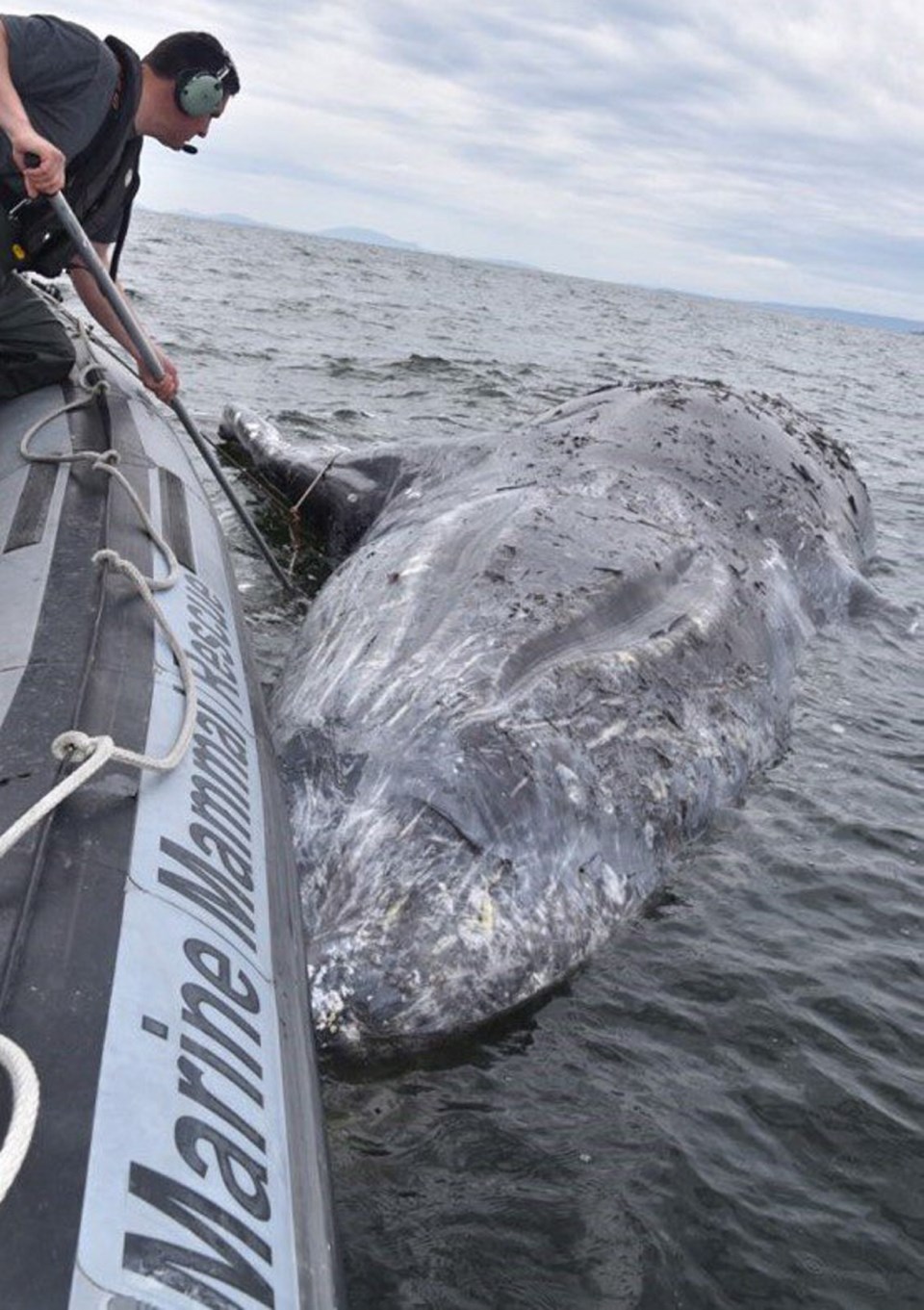People out on the water or strolling the beaches of Vancouver Island and elsewhere on B.C.’s coast are being asked to watch for dead, stranded or distressed grey whales as the massive mammals continue to die at a concerning rate.
The Department of Fisheries and Oceans says six whales have turned up dead in B.C. waters already this year compared with about two deaths annually over the past five years.
The increase matches what officials have observed in Mexico and along the U.S. coast this year, said Paul Cottrell, a marine mammal expert with the federal agency. “They're seeing a spike as well,” he said in an interview Saturday.
Fisheries and Oceans says the strandings began Jan. 1 and continue to date as the whales migrate north to their summer feeding grounds in the Bering, Beaufort and Chukchi seas.
As of May 20, there had been 60 deaths in the U.S. and about 73 in Mexico, in addition to the ones in Canada, the agency said. Last month, the U.S. National Oceanic and Atmospheric Administration declared the rise in deaths an “unusual mortality event,” a move that triggered a scientific investigation into its cause.
The U.S. agency said the deaths along the coasts of California, Oregon, Washington and Alaska were “the most since 2000 when more than 100 whales stranded throughout the year.” The investigation at that time was unable to identify a specific cause, the agency said.
Canadian officials are working closely with their counterparts in the U.S. and Mexico to investigate the deaths.
The latest in B.C. was discovered Tuesday night off Boundary Bay. Canada’s marine mammal response team and the Canadian Coast Guard moved the 13.8-metre adult female to a coast guard base at Sea Island, where a necropsy was performed Thursday.
Cottrell said there was no obvious cause of death, but investigators took photographs and multiple tissue and organ samples for further analysis.
He said preliminary observations indicated that the whale’s body condition was better than the previous five whales found dead in B.C. waters — three stranded in Haida Gwaii, one near Victoria and one on the west coast of Vancouver Island.
“The other five were all quite compromised and emaciated,” he said. The whale found at Boundary Bay, however, had a a higher fat content in the blubber, although Cottrell cautioned that more testing is required.
He added that it’s too soon to know what’s causing the deaths.
In 2000, it was thought that the whales’ feeding had been less productive than previous years, and that remains one of the hypotheses this year as well, he said.
“This year, when they were in Mexico, the Mexicans did kind of a body assessment that they do every year,” Cottrell said.
“Typically, it’s 10 to 15 per cent of animals show that they’re on the skinny side and this year it was 50 to 55 per cent.
“So the indications were [there] early with this migration that there were a number of animals that weren’t showing great body condition and those are the animals likely that are falling out of the population as they migrate north.”
The necropsies are crucial to determine if there are other factors at work — including vessel strikes, entanglements with fishing gear or pathogens — and to identify potential threats to the rest of the population.
That’s where the public can be of invaluable assistance, Cottrell said.
“Our B.C. marine-mammal response program is really dependent on the eyes and ears of the public that are out on the water, that are walking beaches, that see these dead animals or see injured distressed or entangled animals to call us immediately,” he said.
Canada’s marine-mammal incident reporting hotline, at 1-800-465-4336, is monitored 24 hours a day and ensures that investigators can get to a whale as soon as possible.
In the case of a dead whale, a swift response is crucial because fresh tissue and organ samples can provide better information, Cottrell said.
In the case of a stranded live whale, a quick response might save its life.
“An example is the live stranded grey whales that we had in Boundary Bay,” Cottrell said, referring to an incident last month. “We received that information immediately and we were able to get out on the same low tide and then help those animals get back out … into deep water and save those two animals.”
Although listed as a species of special concern under Canada’s Species at Risk Act, eastern North Pacific grey whales have being doing well of late. The U.S. National Oceanic and Atmospheric Administration says the population has recovered since the whaling era and has grown to about 27,000.



